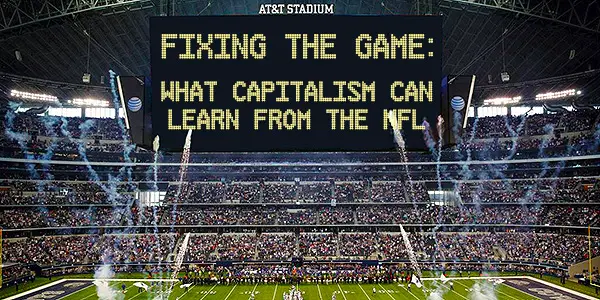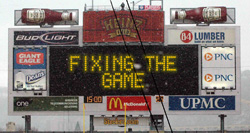 |
 |
06.21.11

Fixing the Game: What Capitalism Can Learn from the NFL
DEAN of the Rotman School of Management, Roger Martin, states in Fixing the Game, "We haven’t looked deeper into blameworthy CEO behavior to understand what really caused it. We haven’t examined the broader theories that underpin our economy and that informed all of those ineffective fixes after the last crash. Instead, we’ve looked for a new scapegoat, chosen to operate from the same fundamental theories, and doubled down on the same fixes." THE STORY BEGINS In 1976, Harvard finance professor Michael Jensen and Dean William Meekling of the Simon School of Business at the University of Rochester published a paper entitled Theory of the Firm: Managerial Behavior, Agency Costs and Ownership Structure [PDF]. They had no way of knowing that it would form the prevailing theory regarding the role of the firm and proper compensation in our society today. The paper argued that the “way to spur executives to best perform their duties in the real market [the world in which factories are built, products are designed and produced and sold, expenses are paid and real dollars of profit show up on the bottom line] was to make their pay significantly dependent on the performance of the company in the expectations market [the world in which shares in companies are traded between investors].” To do this, executives should be compensated with stock and in effect, make them both shareholders and executives. In 1970, in stark contrast to today, stock-based incentives accounted for less than 1 percent of CEO remuneration. That theory, says Roger Martin, “had the unfortunate effect of tightly tying together two markets: the real market and the expectations market.” In Fixing the Game, Martin notes that something similar happened in the NFL. In the NFL there is the real market when teams take to the field to play a game. Real touchdowns and real field goals are scored. And there is the expectations market: gambling. “Gamblers try to guess who will win a given game on a given Sunday and place bets based on that expectation.” The bets are balanced on either side through the use of a point spread which is similar to the stock price in business. WHAT THE NFL DID “But unlike American capitalism, the NFL looked thoughtfully at the relationship between the real game and the expectations game and identified a serious danger….They clearly saw that the pressures of the expectations game could do serious damage to the real game…it could destroy the sport….[they] have enforced a strict separation between the real market and the expectations market…exactly the opposite of the way we have managed it in business.” Martin thinks we could take a lesson from the NFL. We need to quit asking executives to do what they cannot do: beat the expectations forever. “Expectations will get ahead of anything you can actually accomplish” and thus encouraging executives to engage in “point shaving” or “tanking” to cover the spread. “Since 1976, the incidence of large-scale accounting fraud by public companies has increased dramatically. Why? Because executives have millions of reasons to do whatever they can to increase expectations of future earnings.”  American capitalism has embraced a persuasive but ultimately flawed theory to construct their understanding of the economy, the model of executive compensation and the role of business. Our single-minded focus on the expectations market is driving us from crisis to crisis with ever-increasing volatility. Martin skillfully defines the problem and points out why and how we might begin to fix it. 
Posted by Michael McKinney at 08:55 AM
|
BUILD YOUR KNOWLEDGE
 

How to Do Your Start-Up Right STRAIGHT TALK FOR START-UPS 
Grow Your Leadership Skills NEW AND UPCOMING LEADERSHIP BOOKS 
Leadership Minute BITE-SIZE CONCEPTS YOU CAN CHEW ON 
Classic Leadership Books BOOKS TO READ BEFORE YOU LEAD |